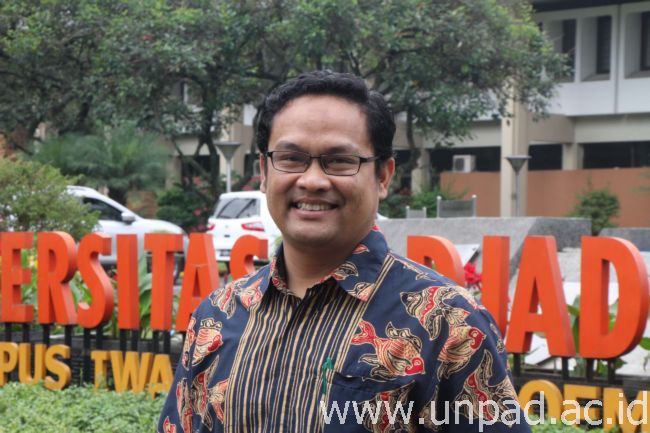[Unpad.ac.id, 10/10/2016] In the near future, Universitas Padjadjaran will have study centers engaged in maritime studies. The establishment of “Maritime Center Unpad” is an effort to contribute in realizing Indonesia as the world’s maritime axis. It is required that contributions from various fields of scholarly to realize the plan.

Coordinator of Council of Experts on the Establishment of Maritime Center Unpad, Dr. Sc. Agr. Yudi Nurul Ihsan, S.Pi., M.Sc., said the founding of the centre is also accompanied by a plan for opening a Master’s program for maritime studies program at Universitas Padjadjaran. This effort aims to strengthen the power of Indonesian human resources in the maritime field. According to Dr. Yudi, the current human resources in the field of maritime sector still need improvements.
“Human resources in maritime needs a lot of developments as compared to those from Malaysia, Singapore, the Philippines, and Thailand,” said Dr. Yudi when interviewed by Unpad PR.
This problem may also contribute to increasing problems in the maritime sector. Dr. Yudi said that currently there are some crucial issues that occur in the maritime sector, including high rates of marine pollution, rampant illegal, unreported, unregulated (IUU) fishings, lack of port infrastructures, and inadequate shipping industry to support inter-island connectivity.
In fact, Indonesia has long declared itself as a maritime nation. Given the history, the birth of which was initiated Djuanda Declaration. Djoeanda Karatwidjaja, the 10th Prime Minister of the Republic of United Indonesia in 1957 declared an initiative that became a milestone of Indonesia as an archipelagic nation. In the declaration stated that Indonesian oceanic area includes the seas around, between, and within the Indonesian archipelago into a single region.
Dr. Yudi also explained that before the declaration was born, Indonesia only had the authority to manage the sea about 3 miles. The waters outside the 3-mile distance is wholly-owned by the international convention.
“With Djuanda Declaration, now known as Wawasan Nusantara, Indonesia’s sovereign area includes the waters and the islands around,” said the lecturer of the Department of Marine Science who is also Deputy Dean of the Faculty of Fisheries and Marine Sciences, Unpad.
In 1982, the United Nations recognised Djuanda Declaration due to the efforts of the Indonesian Ambassador to the UN, Hasjim Djalal, and Indonesian Foreign Minister at the time, Prof. Mochtar Koesoemaatmadja, who also served as Unpad Rector from 1972 to 1974. In fact, through this recognition, Indonesia is authorized waters up to 200 miles from the island.
The idea inspired a number of Unpad academics to become active in strengthening maritime territory. Dr. Yudi said, in order to re-strengthen Indonesia as the pivot of the maritime world, recommendations from academics from various disciplines are needed. This recommendations, of course, require active involvement of the government in implementing the programs.
Indonesia also faces the problems of competitiveness in management of trading sectors in Indonesian waters. Dr. Yudi explained that Indonesia is significantly strategic in terms of geographical conditions, in where it lies between the continents of Asia and Australia. This landscape facilitates international trade route for Indonesia. Approximately 40% of current world trade passes through the area of Indonesia.
“We must be grateful for the Djuanda Declaration. Indonesia now is entitled for a claim on the maritime trade route, “said Dr. Yudi.
More this graduate from Christian Albrechts University zu Kiel on Marine Biogeochemistry said, Indonesia has a legendary trade route that has existed since 2000 BCE. This path includes the Malacca Strait, in where these the lanes of the spice trade lies from the Indonesian archipelago then marketed to various continents.
“The Archipelago used to have Spice Road compared to the Silk Road from China. Until now, the Malacca Strait becomes the most populous strait where ships transporting goods pass. About 40 percent of trade ships pass through the Malacca Strait,” he said.
Due to lack of competitiveness, the strategic Malacca Strait apparently does not give much progress for Indonesia. To that end, supported by the Maritime Center Unpad and the Department of Maritime Sciences, he proposed a target to produce competent human resources in the maritime field.
Looking ahead, the Maritime Center will focus on three studies, namely Policies on Maritime Laws, Marine Environment and Natural Resources, and Maritime Defence ans Security. The studies will be conducted in transdisciplinary method that involves other Faculties, such as Faculty of Law, Faculty of Economics and Business, Faculty of Cultural Science, and Faculty of Social and Political Sciences.
“We have also collaborated with Unpad Alumni Union to build a network with Unpad graduates, particularly those working in the Coordinating Ministry for Maritime Affairs,” said Dr. Yudi. *
Reported by Arief Maulana / eh